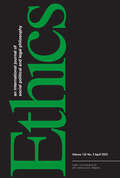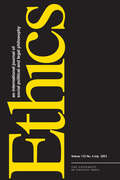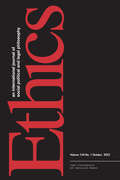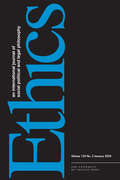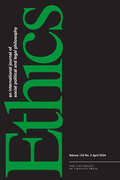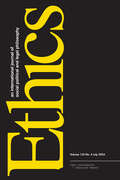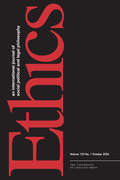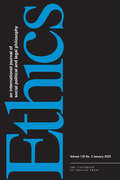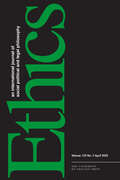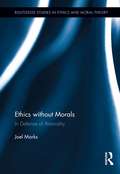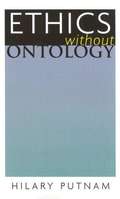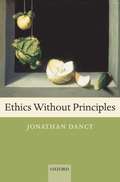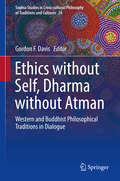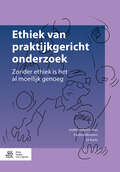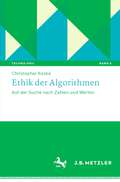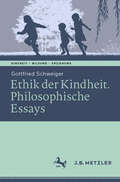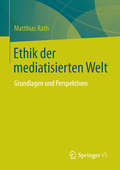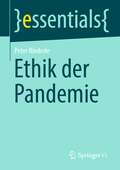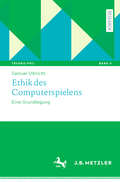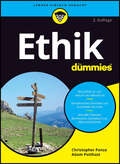- Table View
- List View
Ethics, volume 133 number 3 (April 2023)
by EthicsThis is volume 133 issue 3 of Ethics. Ethics features scholarly work that covers a range of topics pertaining to moral, political, and legal philosophy from a variety of intellectual perspectives, including social and political theory, law, and economics. Articles in the journal present new theories, apply theory to contemporary moral issues, and focus on historical works that have significant implications for contemporary theory. In addition to major articles, Ethics publishes critical discussions, symposia, review essays, and book reviews.
Ethics, volume 133 number 4 (July 2023)
by EthicsThis is volume 133 issue 4 of Ethics. Ethics features scholarly work that covers a range of topics pertaining to moral, political, and legal philosophy from a variety of intellectual perspectives, including social and political theory, law, and economics. Articles in the journal present new theories, apply theory to contemporary moral issues, and focus on historical works that have significant implications for contemporary theory. In addition to major articles, Ethics publishes critical discussions, symposia, review essays, and book reviews.
Ethics, volume 134 number 1 (October 2023)
by EthicsThis is volume 134 issue 1 of Ethics. Ethics features scholarly work that covers a range of topics pertaining to moral, political, and legal philosophy from a variety of intellectual perspectives, including social and political theory, law, and economics. Articles in the journal present new theories, apply theory to contemporary moral issues, and focus on historical works that have significant implications for contemporary theory. In addition to major articles, Ethics publishes critical discussions, symposia, review essays, and book reviews.
Ethics, volume 134 number 2 (January 2024)
by EthicsThis is volume 134 issue 2 of Ethics. Ethics features scholarly work that covers a range of topics pertaining to moral, political, and legal philosophy from a variety of intellectual perspectives, including social and political theory, law, and economics. Articles in the journal present new theories, apply theory to contemporary moral issues, and focus on historical works that have significant implications for contemporary theory. In addition to major articles, Ethics publishes critical discussions, symposia, review essays, and book reviews.
Ethics, volume 134 number 3 (April 2024)
by EthicsThis is volume 134 issue 3 of Ethics. Ethics features scholarly work that covers a range of topics pertaining to moral, political, and legal philosophy from a variety of intellectual perspectives, including social and political theory, law, and economics. Articles in the journal present new theories, apply theory to contemporary moral issues, and focus on historical works that have significant implications for contemporary theory. In addition to major articles, Ethics publishes critical discussions, symposia, review essays, and book reviews.
Ethics, volume 134 number 4 (July 2024)
by EthicsThis is volume 134 issue 4 of Ethics. Ethics features scholarly work that covers a range of topics pertaining to moral, political, and legal philosophy from a variety of intellectual perspectives, including social and political theory, law, and economics. Articles in the journal present new theories, apply theory to contemporary moral issues, and focus on historical works that have significant implications for contemporary theory. In addition to major articles, Ethics publishes critical discussions, symposia, review essays, and book reviews.
Ethics, volume 135 number 1 (October 2024)
by EthicsThis is volume 135 issue 1 of Ethics. Ethics features scholarly work that covers a range of topics pertaining to moral, political, and legal philosophy from a variety of intellectual perspectives, including social and political theory, law, and economics. Articles in the journal present new theories, apply theory to contemporary moral issues, and focus on historical works that have significant implications for contemporary theory. In addition to major articles, Ethics publishes critical discussions, symposia, review essays, and book reviews.
Ethics, volume 135 number 2 (January 2025)
by EthicsThis is volume 135 issue 2 of Ethics. Ethics features scholarly work that covers a range of topics pertaining to moral, political, and legal philosophy from a variety of intellectual perspectives, including social and political theory, law, and economics. Articles in the journal present new theories, apply theory to contemporary moral issues, and focus on historical works that have significant implications for contemporary theory. In addition to major articles, Ethics publishes critical discussions, symposia, review essays, and book reviews.
Ethics, volume 135 number 3 (April 2025)
by EthicsThis is volume 135 issue 3 of Ethics. Ethics features scholarly work that covers a range of topics pertaining to moral, political, and legal philosophy from a variety of intellectual perspectives, including social and political theory, law, and economics. Articles in the journal present new theories, apply theory to contemporary moral issues, and focus on historical works that have significant implications for contemporary theory. In addition to major articles, Ethics publishes critical discussions, symposia, review essays, and book reviews.
Ethics with Aristotle
by Sarah BroadieSarah Broadie gives an argued account of the main topics of Aristotle's ethics: eudaimonia, virtue, voluntary agency, practical reason, akrasia, pleasure, and the ethical status of theoria. She explores the sense of "eudaimonia," probes Aristotle's division of the soul and its virtues, and traces the ambiguities in "voluntary."
Ethics without Morals: In Defence of Amorality (Routledge Studies in Ethics and Moral Theory)
by Joel MarksIn this volume, Marks offers a defense of amorality as both philosophically justified and practicably livable. In so doing, the book marks a radical departure from both the new atheism and the mainstream of modern ethical philosophy. While in synch with their underlying aim of grounding human existence in a naturalistic metaphysics, the book takes both to task for maintaining a complacent embrace of morality. Marks advocates wiping the slate clean of outdated connotations by replacing the language of morality with a language of desire. The book begins with an analysis of what morality is and then argues that the concept is not instantiated in reality. Following this, the question of belief in morality is addressed: How would human life be affected if we accepted that morality does not exist? Marks argues that at the very least, a moralist would have little to complain about in an amoral world, and at best we might hope for a world that was more to our liking overall. An extended look at the human encounter with nonhuman animals serves as an illustration of amorality’s potential to make both theoretical and practical headway in resolving heretofore intractable ethical problems.
Ethics Without Ontology
by Hilary PutnamIn this brief book one of the most distinguished living American philosophers takes up the question of whether ethical judgments can properly be considered objective--a question that has vexed philosophers over the past century. Looking at the efforts of philosophers from the Enlightenment through the twentieth century, Putnam traces the ways in which ethical problems arise in a historical context. Hilary Putnam's central concern is ontology--indeed, the very idea of ontology as the division of philosophy concerned with what (ultimately) exists. Reviewing what he deems the disastrous consequences of ontology's influence on analytic philosophy--in particular, the contortions it imposes upon debates about the objective of ethical judgments--Putnam proposes abandoning the very idea of ontology. He argues persuasively that the attempt to provide an ontological explanation of the objectivity of either mathematics or ethics is, in fact, an attempt to provide justifications that are extraneous to mathematics and ethics--and is thus deeply misguided.
Ethics without Ontology
by Hilary PutnamIn this brief book one of the most distinguished living American philosophers takes up the question of whether ethical judgments can properly be considered objective--a question that has vexed philosophers over the past century. Looking at the efforts of philosophers from the Enlightenment through the twentieth century, Putnam traces the ways in which ethical problems arise in a historical context. Hilary Putnam's central concern is ontology--indeed, the very idea of ontology as the division of philosophy concerned with what (ultimately) exists. Reviewing what he deems the disastrous consequences of ontology's influence on analytic philosophy--in particular, the contortions it imposes upon debates about the objective of ethical judgments--Putnam proposes abandoning the very idea of ontology. He argues persuasively that the attempt to provide an ontological explanation of the objectivity of either mathematics or ethics is, in fact, an attempt to provide justifications that are extraneous to mathematics and ethics--and is thus deeply misguided.
Ethics Without Principles
by Jonathan DancyJonathan Dancy presents a long-awaited exposition and defence of particularism in ethics, a view with which he has been associated for twenty years. He argues that the traditional link between morality and principles, or between being moral and having principles, is little more than a mistake. The possibility of moral thought and judgement does not in any way depend on an adequate supply of principles. Dancy grounds this claim on a form of reasons-holism, holding that what is a reason in one case need not be any reason in another, and maintaining that moral reasons are no different inthis respect from others. He puts forward a distinctive form of value-holism to go with the holism of reasons, and he gives a detailed discussion, much needed, of the currently popular topic of 'contributory' reasons. Opposing positions of all sorts are summarized and criticized. Ethics Without Principles is the definitive statement of particularist ethical theory, and will be required reading for all those working on moral philosophy and ethical theory.
Ethics without Self, Dharma without Atman: Western and Buddhist Philosophical Traditions in Dialogue (Sophia Studies in Cross-cultural Philosophy of Traditions and Cultures #24)
by Gordon F. DavisThis volume of essays offers direct comparisons of historic Western and Buddhist perspectives on ethics and metaphysics, tracing parallels and contrasts all the way from Plato to the Stoics, Spinoza to Hume, and Schopenhauer through to contemporary ethicists such as Arne Naess, Charles Taylor and Derek Parfit. It compares and contrasts each Western philosopher with a particular strand in the Buddhist tradition, in some chapters represented by individual writers such as Nagarjuna, Vasubandhu, Santideva or Tsong Khapa. It does so in light of both analytic concerns and themes from the existentialist and phenomenological traditions, and often in an ecumenical spirit that bridges both analytic and continentalist approaches. Some of the deepest questions in ethics, dealing with the scope of agency, value-laden notions of personhood and the nature of value in general, are intertwined with questions in metaphysics. One set of questions addresses how varying conceptions of selfhood relate to moral values (e.g. the concern of self or selves for the well-being of others); another set of questions addresses how a conception of oneself or one’s selves should or should not affect how one thinks of happiness, or eudaimonia, or – in classical Indian terms – artha, sukha or nirvana. Western philosophy has featured discussion of both, but some would argue that certain traditions of Asian philosophy have offered a more sustained and even treatment of both sets of questions. The Buddhist tradition in particular has not only featured much discussion on both fronts, but has attracted many contemporary philosophers to its distinctive spectrum of approaches, and to what is – from many ‘Western’ points of view – a seemingly subversive analysis of ego, selfhood and personhood, whether in metaphysical, phenomenological or other incarnations.
Ethiek van praktijkgericht onderzoek: Zonder Ethiek Is Het Al Moeilijk Genoeg
by Eveline Wouters Sil AartsDit boek heeft als doel onderzoekers in de praktijk, en met name begeleiders van onderzoek in de praktijk op het hbo en daarbuiten, een handreiking te bieden om ethische dilemma’s waar te nemen en bespreekbaar te maken. Onderzoek in de praktijk is al lastig op zich, het goed herkennen, omgaan met en begeleiden van situaties die ethische vragen oproepen, die gaan over wat goed, wenselijk en verantwoord onderzoek is, maken het onderzoek nog lastiger. Aan de hand van verschillende fases van het onderzoek (vanaf het eerste idee tot en met de rapportage) worden verschillende ethische vraagstukken besproken. Deze vraagstukken gaan vaak over de afweging hoe het belang van de (individuele) deelnemer opweegt tegen het belang van de kennisontwikkeling door middel va het onderzoek of het belang van de onderzoeker. Maar ook: wat te doen met vertrouwelijke informatie, of de wensen van de opdrachtgever, hoe de resultaten eerlijk gepresenteerd kunnen worden en vele andere vraagstukken. Deze worden alle geïllustreerd met voorbeelden uit de praktijk. Daarnaast wordt specifiek ingegaan op dilemma’s rondom beoordelen van (afstudeer)werk, de nieuwe technologische mogelijkheden van dataverzameling (big data), en de wet- en regelgeving.
Ethik-Cafés im Sozial- und Gesundheitswesen: Sich über aktuelle Lebensfragen ethisch verständigen und austauschen
by Manfred Baumann Carola FrommSeit über zehn Jahren moderieren die Autor*innen mit hohem Zuspruch das Ethik-Café in Einrichtungen des Sozial- und Gesundheitswesens. Menschen aus unterschiedlichen Berufen, Patient*innen, An- und Zugehörige sowie ethisch Interessierte haben im Ethik-Café die Möglichkeit, aus ihrer persönlichen und beruflichen Perspektive ethische Fragestellungen zu diskutieren, die für ihren Alltag relevant sind. Ethik-Cafés sind niederschwellig, multiprofessionell, interdisziplinär. Die Teilnehmer*innen profitieren von dieser Perspektivenvielfalt. Das Buch stellt die Konzeption sowie deren Evaluation, die theoretischen und methodischen Voraussetzungen und in vielen Beispielen die praktische Umsetzung von Ethik-Cafés dar. Das entwickelte Vier-Phasen-Modell des ethischen Prozesses wird exemplarisch in 25 Ethik-Cafés zu Themen aus dem Sozial- und Gesundheitswesen angewendet und umgesetzt. Das Buch richtet sich an Mitarbeiter*innen und Führungskräfte im Sozial- und Gesundheitswesen, Lehrer*innen, Lernbegleiter*innen und Auszubildende in der generalistischen Pflegeausbildung, an Fort- und Weiterbildungsreferent*innen, Studierende, Ehrenamtliche sowie alle ethisch Interessierten.
Ethik der Algorithmen: Auf der Suche nach Zahlen und Werten (Techno:Phil – Aktuelle Herausforderungen der Technikphilosophie #6)
by Christopher KoskaAlgorithmenethik ist ein Versuch zur Spezifikation von moralphilosophischen Fragen, die sich aus den Veränderungs- und Transformationsprozessen der Digitalisierung ergeben. Als wissenschaftliche Unternehmung zielt sie in erster Linie darauf, ethische Kriterien und Prinzipien für eine nachhaltige Wertschöpfung durch eine verantwortungsbewusste und vertrauensvolle Datennutzung zu finden und zu begründen. Ziel dieses Buches ist es, einen Beitrag zur Verortung und zum weitläufigen Entwicklungspotential einer eigenständigen Algorithmenethik zu leisten. Dabei besteht die zentrale Aufgabe darin, das Transparenz- und Kontrollproblem im Kontext von digitalen Technologien, welches sich auch als ein Kompetenz- bzw. Befähigungsproblem darstellen lässt, begrifflich zu beschreiben und einem ethischen Zugriff zugänglich zu machen, um es anschließend zu beurteilen und Gestaltungsperspektiven aufzuzeigen.
Ethik der Kindheit: Philosophische Essays (Kindheit – Bildung – Erziehung. Philosophische Perspektiven)
by Gottfried SchweigerDieses Buch versammelt Essays zur Philosophie der Kindheit. Worin besteht eine gerechte Gesellschaft für Kinder? Sind Kinder besonders verletzbar? Was schulden wir minderjährigen Flüchtlingen oder Kindern in Armut? Was ist eine gute Jugend? Die Essays in diesem Buch stellen und beantworten diese Fragen aus Sicht einer Ethik der Kindheit.
Ethik der Macht der öffentlichen Verwaltung: Zwischen Praxis und Reflexion (Geschichte und Ethik der Polizei und öffentlichen Verwaltung)
by Nanina Marika Sturm Emanuel JohnDiesem Buch liegt die These zugrunde, dass sich ein Verständnis der Macht der öffentlichen Verwaltung nicht allein auf die Befugnisse beschränkt, mit denen deren Mitarbeiter*innen ausgestattet sind. Um die verschiedenen Dimensionen der Macht der öffentlichen Verwaltung zu erkunden, werden Beiträge aus verschiedenen fachlichen Perspektiven versammelt. So soll einerseits deutlich werden, inwiefern in die Macht der öffentlichen Verwaltung auch soziale und kulturelle Faktoren einfließen. Andererseits sollen dadurch Perspektiven für eine ethische Gestaltung der alltäglichen Verwaltungspraxis freigelegt werden.
Ethik der mediatisierten Welt
by Matthias RathDer Band erweitert die Medienethik über Medieninhalte und Medienpraxis hinaus zur ,,Ethik der mediatisierten Welt". Er fußt dabei einerseits auf der Einsicht in die grundsätzliche Medialität des Menschen sowie die daraus folgende Prägung seiner gesellschaftlichen Realität und überbrückt andererseits die Kluft zwischen normativer Ethik und deskriptiven Kommunikations- und Medienwissenschaften. Eine Ethik der mediatisierten Welt muss dabei nicht nur die eigenen philosophischen Wurzeln bedenken, sondern die medienethischen Grundbegriffe auch interdisziplinär beherrschen. Sie wird daher als integrative Disziplin zwischen Philosophie und Kommunikations- und Medienwissenschaften verstanden.
Ethik der mediatisierten Welt: Grundlagen und Perspektiven
by Matthias RathDer Band erweitert die Medienethik über Medieninhalte und Medienpraxis hinaus zur „Ethik der mediatisierten Welt“. Er fußt dabei einerseits auf der Einsicht in die grundsätzliche Medialität des Menschen sowie die daraus folgende Prägung seiner gesellschaftlichen Realität und überbrückt andererseits die Kluft zwischen normativer Ethik und deskriptiven Kommunikations- und Medienwissenschaften. Eine Ethik der mediatisierten Welt muss dabei nicht nur die eigenen philosophischen Wurzeln bedenken, sondern die medienethischen Grundbegriffe auch interdisziplinär beherrschen. Sie wird daher als integrative Disziplin zwischen Philosophie und Kommunikations- und Medienwissenschaften verstanden.
Ethik der Pandemie (essentials)
by Peter RinderleDie Corona-Krise zwingt uns zu gewaltigen Veränderungen unserer privaten Lebensführung und erfordert höchst umstrittene politische Maßnahmen zum Schutz der Gesundheit und zur Verteilung knapper Ressourcen. Sie verlangt große Anstrengungen von den Wissenschaften, und sie hat nicht zuletzt erhebliche Auswirkungen auf die kulturelle Identität von Gemeinschaften. Dieses Büchlein gibt einen Überblick über die wichtigsten Fragen und Probleme, die eine globale Pandemie für die philosophische Ethik aufwirft. Nach einer Analyse des Begriffs und des Werts der Gesundheit präsentiert und bewertet es die prominentesten Lösungsvorschläge und soll mit einer Reflexion über die Forderungen der Gerechtigkeit und die Inhalte eines guten Lebens zur Orientierung unseres persönlichen und politischen Handelns beitragen.
Ethik des Computerspielens: Eine Grundlegung (Techno:Phil – Aktuelle Herausforderungen der Technikphilosophie #4)
by Samuel UlbrichtTrotz der steigenden Zahl an Computerspielern weltweit markiert die moralische Einordnung von Computerspielhandlungen ein bislang ungelöstes Rätsel der philosophischen Ethik. Angesichts der Brisanz der Thematik im Alltag (zu sehen an der ‚Killerspiel-Debatte‘) ist augenfällig, dass es einer differenzierten fachlichen Klärung des Phänomens bedarf: Kann das Spielen von Computerspielen unmoralisch sein? Zur Beantwortung dieser Frage erörtert der Autor zunächst, was wir überhaupt tun, wenn wir Computerspiele spielen: Über welche Art von Handlung sprechen wir? Im zweiten Schritt erfolgt eine moralische Einordnung, die erschließt, ob (und wenn ja, warum) manche Computerspielhandlungen moralisch problematisch sind. Die hier angestellten Überlegungen gewähren einen grundlegenden Einblick in die normative Dimension des Computerspielens.Samuel Ulbricht hat in Stuttgart Philosophie und Deutsch auf Lehramt studiert und dort sein erstes Staatsexamen mit Auszeichnung absolviert. Für seine Abschlussarbeit zur Ethik des Computerspielens erhielt er den „Preis der Freunde der Universität Stuttgart“. Aktuelle Forschungsschwerpunkte sind normative Unterschiede der Moraltheorien, Problembereiche der angewandten Ethik sowie die Ästhetik und Ethik des Computerspielens. Derzeit unterrichtet er die Fächer Deutsch und Ethik am Liselotte-Gymnasium in Mannheim.
Ethik für Dummies (Für Dummies)
by Christopher Panza Adam PotthastWas ist richtig und was ist falsch? Wer entscheidet das, und warum ist die Antwort auf diese Frage oft so schwer zu finden? Fragen wie diese beschäftigen wohl jeden irgendwann einmal. Christopher Panza und Adam Potthast helfen Ihnen, sich den oft furchtbar komplizierten Antworten darauf zu nähern. Sie erläutern Ihnen die häufig schwer verständlichen Schriften von Kant, Hobbes und Co., erklären, wie sich Wissenschaft und Religion zur Ethik verhalten und vieles mehr. Darüber hinaus diskutieren sie Themen wie biomedizinische Ethik oder Umweltschutz, die aktuell die Öffentlichkeit bewegen. So ist dieses Buch der perfekte Begleiter für Sie, wenn Sie sich systematisch mit ethischen Fragen beschäftigen wollen.
